The Millikin Medal for Excellence in Young Adult Literature
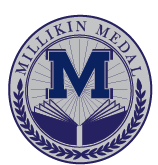 The Millikin Medal for Excellence in Young Adult Literature was founded in the fall of 2015 by professors Mike Cook (English), Amanda Pippitt (Staley Library), and Rachel Bicicchi (Staley Library). The purpose of the project is to bring together future educators, writers, historians, librarians, and parents to establish and facilitate a sustainable literary award. In their post-graduation lives, students may teach award-winning literature, serve on award committees, encourage overall literacy, or simply help their children find outstanding literature. Students on the Millikin Medal committee experience first-hand how award committees determine their award criteria, create a list of nominees, choose their winner, and handle the public relations that follow.
The Millikin Medal for Excellence in Young Adult Literature was founded in the fall of 2015 by professors Mike Cook (English), Amanda Pippitt (Staley Library), and Rachel Bicicchi (Staley Library). The purpose of the project is to bring together future educators, writers, historians, librarians, and parents to establish and facilitate a sustainable literary award. In their post-graduation lives, students may teach award-winning literature, serve on award committees, encourage overall literacy, or simply help their children find outstanding literature. Students on the Millikin Medal committee experience first-hand how award committees determine their award criteria, create a list of nominees, choose their winner, and handle the public relations that follow.
The inaugural, 2015-16 committee of Millikin students and faculty established the following mission and criteria for the Millikin Medal:
The Millikin Medal for Excellence in Young Adult Literature is awarded each spring to a work of fiction, published in the previous year, of outstanding literary merit that inspires a love of reading in a young adult audience. The judging panel for the Millikin Medal consists of current Millikin students and faculty.
- A "young adult" audience is defined as high school through college age
- Book inspires and encourages young adult literacy through inclusion of plots, characters, and themes young adults can connect with
- Books must be a stand-alone narrative
- Books considered are limited to print fiction, but do not exclude genre fiction and may vary in form and literary style
- Published in the year since the previous award cycle's finalist list was created
- Literary merit includes the following aspects:
- The author creates a unique, realistic voice that informs the way the story is told,
- The book includes diverse characters in terms of disability, ethnicity, race, gender, nationality, religion, sexuality, or socioeconomic status. Removal of the character(s) from the plot would significantly affect the plot,
- The book does not promote stereotypes,
- The book does not suffer from formulaic or overused plots, characters, or themes.
2025 Millikin Medal Winner
 Looking for Smoke by K. A. Cobell
Looking for Smoke by K. A. Cobell
Since moving to the Blackfeet Reservation with her parents, Mara Racette has felt like an outsider, taunted by her tight-knit classmates for growing up far away. So when a local girl includes Mara in a traditional Blackfeet giveaway to honor her missing sister, Mara thinks she'll finally make some friends.
Instead, a girl from the giveaway, Samantha White Tail, is found murdered. Because the members of the giveaway group were the last to see Samantha alive, each becomes a person of interest in the investigation:
New girl Mara, who hated Samantha for being particularly cruel.
Grief-stricken Loren Arnoux, who was Samantha's best friend until Loren's sister's disappearance drove a wedge between them.
Class clown Brody Clark, whose unreciprocated crush on Samantha is an open secret.
And tough guy Eli First Kill, who has his own complicated history with Samantha.
Despite deep mistrust, the four must now take matters into their own hands and clear their names. Even though one of them may be the murderer.
Committee members loved this compelling, twisty novel that engages the reader in a narrative with fully realized, distinct characters, an emotionally charged set of mysteries, and important issues surrounding Missing and Murdered Indigenous women, friendship, family, grief, tradition, guilt, and resilience. The book deftly ties together a multitude of issues without overwhelming the reader or losing momentum. So good, you'll want to read it at least twice to catch all the clues you missed the first time through!
2025 Millikin Medal Honor Books
 The Brightwood Code by Monica Hesse
The Brightwood Code by Monica Hesse
One word cost lives- and could ruin hers. Seven months ago, Edda was on the World War I front lines as one of two hundred "Hello Girls," female switchboard operators employed by the US Army. She spent her nights memorizing secret connection codes to stay ahead of spaying enemies, and her days connecting vital calls between platoons and bases and generals, all trying to survive- and win- a merciless was. Their lives were in Edda's hands, and one day, in fateful seconds, everything went wrong.
Now Edda is back in Washington, DC, working as a telephone operator and trying to forget her time in France. But when she receives a cryptic phone call from a stranger who knows the fateful code word "Brightwood," Edda has no choice but to confront her past. With precious few clues and help only from Theo, a young man bearing his own WWI scars, Edda races to uncover what secrets may have followed her across the ocean.
Breathless, haunting, and rich with historical detail, The Brightwood Code speaks to the depths of trauma, the power of memory, and the brutality of being a woman in a war built by men.
Committee members found this dual timeline, historical novel compelling and appreciated the way the structure of the novel wasn't used only as a plot trope to string out a mystery plot. Edda's past experiences clearly inform her present state of mind, and had us guessing what was real and imagined late into the night. A powerful story about accepting trauma, finding self-forgiveness, and moving forward that brings to light the overlooked history of the Hello Girls of WWI.
 Everything We Never Had by Randy Ribay
Everything We Never Had by Randy Ribay
The Maghabol family journey begins with sixteen-year-old Francisco, who has left everything behind in the Philippines to seek his fortune in California. Following this life-changing decision, each generation of Maghabol boys must forge a path forward while contending with the past.
Watsonville, CA, 1930. Francisco barely ekes out a living picking apples. As he spends what little he earns at dance halls and faces increasing violence from white men in town, Francisco wonders if he should've never left the Philippines.
Stockton, CA, 1965. Emil works hard and keeps his head down despite the prejudice he faces at school and the long shifts he takes at a restaurant to make ends meet. He refuses to be like his unreliable labor organizer father, Francisco. He's going to make it in this country, no matter what or who he has to leave behind.
Denver, CO, 1983. Chris is determined to prove that his overbearing father, Emil, can't control him. But when an assignment on family roots sends Chris out of the football field and into the library, he discovers a hunger to know more about Filipino history -- even if his father dismisses his interest as un-American and unimportant.
Philadelphia, PA, 2020. Enzo struggles with anxiety as a global pandemic breaks out and his abrasive grandfather moves in. While tensions are high between his dad and his lolo, Enzo's daily walks with Lolo Emil have him wondering if maybe he can help bridge the decades-long rift between the two men.
Committee members appreciated this in-depth exploration of generational trauma, fatherhood, and manhood while learning about Filipino American history through the eyes of the Maghabol men. Each character could have had their own book, but what made the story impactful was the way they weaved together into one. The book is both heartwarming and heartbreaking, and we grew to empathize with each character along the way, and understand how the past brings us to the present with no simple answers.
Members of the 2025 Millikin Medal Committee were: Tabitha Barowsky, Rachel Bicicchi, Kaitlin Glause, Shinta Koganezawa, Nyla Kyles, Julia Lambert, Eden Niebrugge, and Amanda Pippitt
2024 Millikin Medal Winner
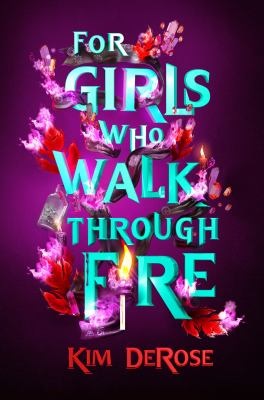 For Girls Who Walk Through Fire by Kim DeRose
For Girls Who Walk Through Fire by Kim DeRose
Elliott is fed up with her ineffectual teen sexual assault survivor's support group, but thinks she may have found the answer in a spell book she found among her late mother’s belongings. If the legal system won’t hold perpetrators accountable, maybe magic will. She recruits three members of the survivor support group who strike her as similarly fed up – Madeline, Chloe, and Bea. But the newly formed coven does not heed the warning the book provides, “that which you seek is also seeking you,” and while revenge brings temporary satisfaction, it also has unintended consequences. Soon, they are faced with the question of what it really means to manifest justice. Just how much pain is power worth?
Committee members felt that the book handled sexual assault and rape in detailed yet sensitive ways. They also liked how, despite their shared experience, Elliot, Bea, Chloe, and Bea all had different stories and responded to their trauma in their own ways. They appreciated that the characters didn’t all feel the same way about what happened to them, or promote one “right” path for healing and recovery. The magic system was used to fully explore the themes and characters.
2024 Millikin Medal Honor Books
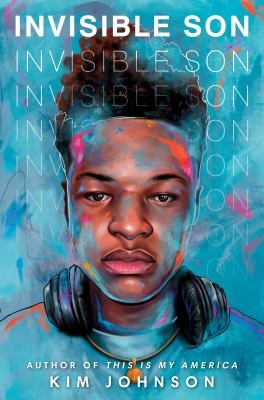 Invisible Son by Kim Johnson
Invisible Son by Kim Johnson
Andre Jackson just got out of MacLaren Youth Correctional Facility for a crime he didn’t commit. But just as Dre is ready to start up his life again, the world shuts down due to Covid-19. Dre takes solace in his relationship with neighbor Sierra Whitaker, but Sierra’s brother Eric is missing, and Dre can’t shake the feeling that Eric had something to do with his jail time, and more importantly, something bigger is wrong – because Eric wouldn’t just leave Sierra like that, would he? As the Black Lives Matter protests in Portland unfold, and Dre starts to uncover the truth about Eric and Sierra’s white adoptive family, he has to decide how far he’ll go to expose the truth.
Committee members really liked this relatable story of a teenager experiencing the Covid pandemic. They also liked how it covered a lot of issues related to race, the justice system, romance, interracial adoption, and death of loved ones and linked them altogether without feeling like it was going for the kitchen sink of social issues approach.
 Give Me a Sign by Anna Sortino
Give Me a Sign by Anna Sortino
After a disappointing junior year of high school, Lilah longs to return to Gray Wolf, a summer camp she attended through 8th grade, and the only place where she didn’t have to explain her deafness to anyone else. After being thrilled to be accepted as a junior counselor, Lilah arrives at Gray Wolf to find that things have changed. The camp is in desperate need of funding, and the campers she's responsible for all have their own struggles and challenges. There are also her fellow counselors, including a YouTuber who isn’t deaf but is chasing clout by teaching American Sign Language. And then there is Isaac. Lilah never thought about the possibility of romance, and she’s not sure what to do next.
Committee members liked how the book explored different aspects of Deaf culture, as well as the many different ways deafness is experienced. They thought the author did a good job mixing humor into a story with serious stakes, and the writing style used to represent mis-heard or not-heard words helped Lilah's voice and experience come to life.
Members of the 2024 Millikin Medal Committee were: Jacquelin Anderson, Tabitha Barowsky, Rachel Bicicchi, Olivia Cooper, Aubrey Diedrich, Kaitlin Glause, and Amanda Pippitt
2023 Millikin Medal Winner
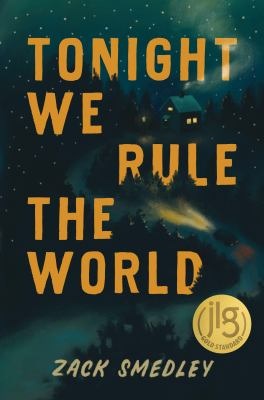 Tonight We Rule the World by Zack Smedley
Tonight We Rule the World by Zack Smedley
Once Owen meets Lily, his life changes. Previously shy and somewhat solitary, for the next few years he has a girlfriend, a supportive friend group, and works on developing his voice as a writer. Everything is great, until someone reports that he has been sexually assaulted to the school administration, starting a discovery process that Owen wants no part of. Suddenly everyone is pressuring him to reveal the identity of the assailant. The narrative alternates between before and after the assault, fully exploring the consequences of the assault for Owen, his family, his friends, and Lily.
Members of the committee pointed to the emotional impact of the story, praising how it illuminates a rarely discussed issue in all its complexity and messiness. They loved the character development and dialog and felt this book is something teens and their parents need to read and talk about together.
2023 Millikin Medal Honor Books
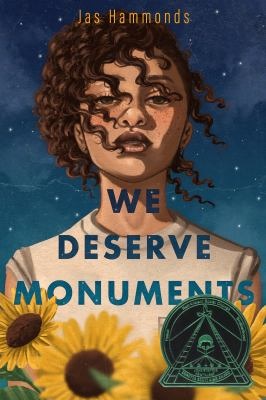 We Deserve Monuments by Jas Hammonds
We Deserve Monuments by Jas Hammonds
Her senior year of highschool, Avery and her parents move from DC to rural Bardell, Georgia to care for her terminally ill grandmother. She knows that something happened in her family's past that caused bad blood between her mother and grandmother, but her attempts to dig deeper are rejected and she instead seeks connection with two new friends- Simone, the girl next door (and daughter of her mother's childhood friend), and Jade, a girl from prominent family who owns a local spa hotel. Avery and Simone's friendship takes a turn towards romance, while the past of Avery's family, the unsolved murder of Jade's mother, and the town are gradually revealed.
Members of the committee appreciated the novel's exploration of generational trauma and violence, and the deeper understanding they gained that, for many, these events occurred not in the distant past, but within the lifetimes of living family members. Through these fully realized characters, they were able to see how we each can rewrite our own histories.
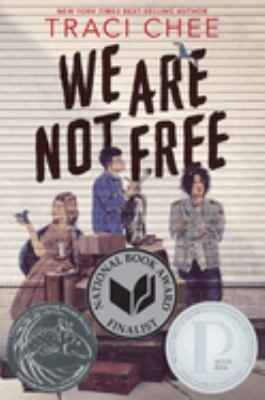 We Are Not Free by Traci Chee
We Are Not Free by Traci Chee
A moving depiction of 14 Nisei (second-generation Japanese Americans) friends and their different, but interconnected experiences in U.S. incarceration camps in World War 2.
Members of the committee were impressed that, though the chapters were each narrated by a different member of the friend group, there was still a connected, overarching story. Each character was a distinct voice with their own experience, thoughts, and feelings. They felt the novel would be especially valuable as a classroom text, used as a way to illuminate personal experiences while learning the history of Japanese incarceration during WW2.
Members of the 2023 Millikin Medal Committee were: Jacquelin Anderson, Rachel Bicicchi, Shannon Cornthwaite, Kaitlin Glause, Delaney Haubner, and Amanda Pippitt
2020 Millikin Medal Winner
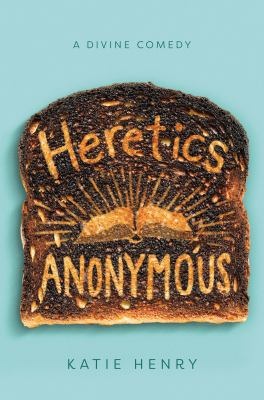 Heretics Anonymous by Katie Henry
Heretics Anonymous by Katie Henry
Michael and his family have moved, yet again, as his father changes jobs, and Michael is angry. As an atheist, he is feeling out of place at his new, Catholic school. When he meets Lucy, who argues with a teacher in class, he feels he may have found a kindred spirit, but is surprised her feminist principles exist alongside a strong, Catholic faith. Through Lucy, he meets the members of "Heretics Anonymous," a group of students supporting each other as outsiders at St. Clare's- Avi (Jewish and gay), Eden (a practicing pagan), and Max (a Unitarian with a penchant for cloaks).
Michael begins to push the group to take action against some of St. Clare's policies such as the strict dress code and abstinence-only sex education. As they wage their anonymous, rebellious campaigns, some members begin to question whether they are making things at the school better, or worse for their fellow students. In a moment of anger and frustration, Michael takes it upon himself to take action on behalf of the group, putting them all at risk of discovery and retribution.
Members of the committee enjoyed spending time with the well-developed characters of Heretics Anonymous, a group of friends with different beliefs that are able to talk about serious topics, listen to each other, and (even if they have their falling outs) stay friends, even if they don't have exactly the same opinions. They also enjoyed the humor brought into narrative, the humanity brought to several of the antagonists, the exploration of civil disobedience, and the growth of the characters through the events of the novel.
2020 Millikin Medal Honor Books
 The Downstairs Girl by
The Downstairs Girl by
Orphan Jo Kuan and her adoptive grandfather live in Atlanta 25 years after the Civil War. As Chinese Americans not allowed to own a home or even rent, they live in secret in a former Underground Railroad "bunker" connected to the home and printing press of the Bell family. Making ends meet is tough, and when she loses her job as a hat maker, she is forced to re-enter service as a maid to the spoiled, bratty daughter of a local wealthy family. She also secretly begins writing an advice column for the Bell family's paper under the pen-name "Miss Sweetie," challenging many of the gender and racial norms of the day. When Jo begins to investigate her family origins and opponents begin searching out the identity of Miss Sweetie, she becomes involved in a situation that puts her and her grandfather in danger from a local crime boss.
Members of the committee enjoyed the unique perspective, setting, and plot elements of this novel, along with all the history they learned about Chinese Americans, suffragists, and social class in the Reconstruction era South. Jo and her extended chosen family were a window into issues and a time and place many had never learned about before.
 Wild and Crooked by
Wild and Crooked by
Kalyn Spence and her mother return to Samsboro, Kentucky to live with her grandmother in a trailer in the middle of a scrapyard. As she starts at the local high school, Kalyn crafts a new name and personality to match...her father is in prison for murder and she needs to stay out of the crosshairs of the locals, who still hold a grudge against her whole family. At the school, she makes friends with her new, less antagonistic personality, but finds she can be her true self (if not her true name) around Gus Peake, a student with cerebral palsy known by most of the school as the "disabled kid," even if he'd rather be know for his fashion sense. The friendship is challenged when Kalyn finds out the person her father is in prison for murdering is Gus's father, and they begin investigating what actually happened years ago. Then, the rest of the town finds out her identity...
Members of the committee enjoyed that despite the heaviness of the issues explored, there was still space for humor and adventure in the story. They also enjoyed the depth and complexity of Gus and Kalyn as characters and the exploration of how the past informs the present in a small town.
Members of the 2020 Millikin Medal Committee were: Tabitha Barowsky, Rachel Bicicchi, Kaitlin Glause, Amanda Pippitt, and Anna Quick
2019 Millikin Medal Winner
 The Astonishing Color of After by Emily X. R. Pan
The Astonishing Color of After by Emily X. R. Pan
After her mother dies by suicide Leigh Chen Sanders is convinced that her spirit has returned as a bird. Seeking answers, Leigh travels with her father to Taiwan, where he leaves her with her mother's parents, whom she has never met, and who do not speak English. Feeling left behind, disconnected, and, as a mixed race girl, an object of curiosity to the Taiwanese locals, she struggles to process her feelings about her mother's death and her changing relationship with her father and her best friend back home (whom she feels guilty about kissing the night her mother died). When a mysterious family friend steps in to act as a translator and guide, and Leigh finds a box of magical incense that immerses her in memories of key moments in her family's past, will she finally understand what the bird wants from her? A vivid, lyrical, and magical exploration of grief, family, and friendship.
2019 Millikin Medal Honor Books
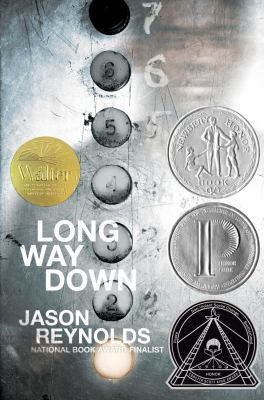 Long Way Down by Jason Reynolds
Long Way Down by Jason Reynolds
Will's brother has just died in a shooting and Will is sure he knows who did it. He grabs a gun and heads for the elevator of his building to follow through on the rules of his neighborhood: no crying, no snitching, get revenge. Over the course of a minute, as the elevator stops at each floor, a new person enters, causing Will to re-evaluate his initial decision. Told in verse, this novel is an intense, fast, and gut-wrenching story of how a life can change in an instant, and how the choices we make reverberate into the future.
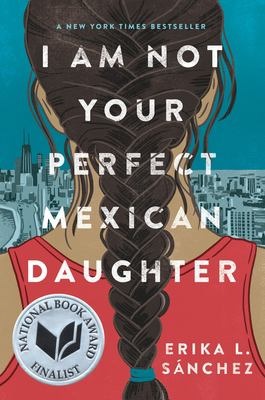 I Am Not Your Perfect Mexican Daughter by Erika Sánchez
I Am Not Your Perfect Mexican Daughter by Erika Sánchez
Olga was the perfect Mexican daughter, but Olga is dead after a traffic accident, leaving her younger sister Julia behind to face the weight of her parents' expectations while struggling with her own depression. Julia is spiky, funny, and smart, but also sometimes mean and self-centered. She has dreams of becoming a writer and artist, and wants to try dating the cute boy she meets at her favorite bookstore. After a few odd discoveries in her sister's room, Julia isn't so sure Olga was perfect after all. Should she seek the truth? Or, leave well-enough alone? A compelling and fully-realized coming-of-age story of a young, second-generation American Latinx woman.
Members of the 2019 Millikin Medal Committee were: Aiyana Davis, Bella Hernandez, Marissa King, Alexia McDermott, Destiny Musick, Teressa Naples, Rachel Roberts, Karly Grice, Rachel Bicicchi, and Amanda Pippitt.
2018 Millikin Medal Winner
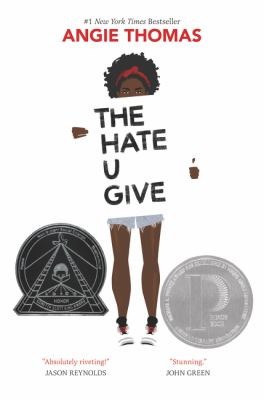 The Hate U Give by Angie Thomas
The Hate U Give by Angie Thomas
The death of Starr's childhood friend Khalil becomes a national headline after he is fatally shot by a police officer and her community erupts in controversy. The sole witness to the shooting, Starr is forced to watch Khalil's reputation slandered in the media and must make a decision about whether to come forward, putting her own reputation, her relationships with family and friends, and possibly her life, at risk.
2018 Millikin Medal Honor Book
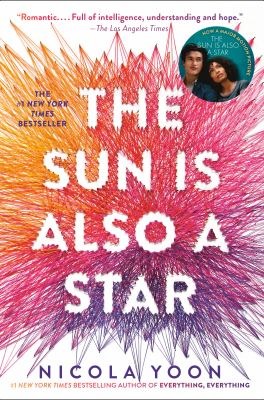 The Sun is Also a Star by Nicola Yoon
The Sun is Also a Star by Nicola Yoon
Daniel and Natasha cross paths, and fall in love (he, wholeheartedly, she, against her better judgment), as they go about their separate missions over the course of the day in New York City. Natasha is bound and determined to keep her family from being deported to Jamaica, Daniel is on his way to an interview for admission into an Ivy League school (something his Korean immigrant parents are more excited about than he is). The reader follows their path while learning how the interconnected dreams, dramas, and tragedies of various other people affect the outcome of Natasha and Daniel's love story.
Members of the 2018 Millikin Medal Committee were: Rachel Roberts, Kira Dickson, Karly Grice, Rachel Bicicchi, and Amanda Pippitt.
2017 Millikin Medal Winner
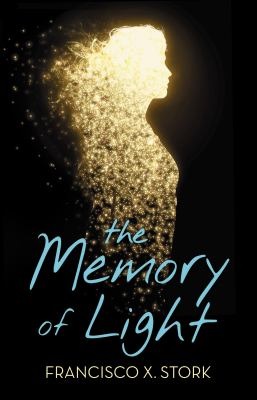 The Memory of Light by Francisco X. Stork
The Memory of Light by Francisco X. Stork
Vicky Cruz hid her depression from friends and family well, until her suicide attempt. Waking up in a hospital, finds herself in a recovery group with Mona, E.M., and Gabriel, three other teens experiencing a range of mental illnesses, including self-harm, anger management issues, and schizophrenia. Drawing strength from each other, and from their therapist, Dr. Desai, the teens struggle towards self-understanding, openness, resilience, and reintegration with their lives outside the hospital.
Comments from the committee: "The Memory of Light explores the often taboo topic of mental illness through engaging, diverse characters in a way that is honest, touching, and ultimately hopeful. Through Vicky and her friends, this important book provides teens suffering from mental illness with hope and an example of a courageous character accepting help to being her journey to recover, and allows readers outside of that experience an opportunity for empathy and understanding." "The novel is beautifully written and is a thoughtful and necessary lens into the complexity of mental illness, one that requires readers to acknowledge the diversity of experience and to question long-help assumptions and stereotypes." "There need to be more books like The Memory of Light that portray the reality of the world in an objective fashion, allowing all readers to connect with what they may experience, or understand what they do not." "It handles a relatively taboo topic in a stark, yet balanced fashion. There are many young adult readers who would benefit from this book and what it brings to the literary world." "This book takes a topic that's often romanticized and shows that mental illness is a constant struggle rather than something that magically goes away after a certain amount of treatment. It also reminds readers that mental illness can affect anybody, regardless of gender, class, or race." "A much-needed look at both the complexities of mental health issues and mental health care, with a cast of diverse characters that we don't normally get to see outside of stereotypical side roles in stories like this."
2017 Millikin Medal Honor Book
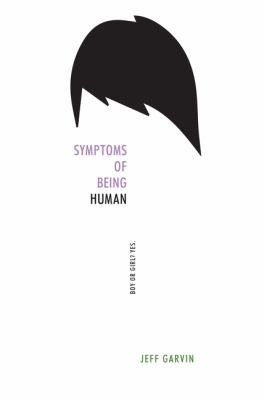 Symptoms of Being Human by Jeff Garvin
Symptoms of Being Human by Jeff Garvin
Riley, a gender fluid teen, is struggling to make friends (or at least not make enemies) at their new high school, while also dealing with the stresses of being the perfect child during their father's congressional re-election campaign and the occasional panic attack. After writing about their experience on an anonymous blog, and connecting with (and crushing on) a fellow outcast at school, Riley begins to feel like things are under control. But when someone begins to troll the blog, threatening to out them at school, Riley has some big decisions to make.
Comments from the committee: "In Symptoms of Being Human, the mystery of Riley's sex at birth doesn't matter, even though many readers will spend the whole book trying to figure it out. Riley is a human being, and this novel puts that at the forefront. Relatively unexplored topics that are just now hitting the mainstream in our society must be written about, and they must be written about well. That is why Symptoms of Being Human is ultimately deserving of this award." "One of the most important books the committee read, Symptoms of Being Human offers readers an important look at the fluidity of identity and of being a human being. The book is a must-read for everyone." " It's high time that society begins to look past the gender binary. Although we've been trained to categorize people into either male or female, the diversity of identity exists beyond that binary; characters in literature need to do the same." "This book will revolutionize the understanding young readers (and some not-so-young readers) have of gender identity. One of the most important books I've read in a long time."
Members of the 2017 Millikin Medal Committee were: Emma Hoyer, Sam Miller, Matthew Gremo, Mikayla Mendenhall, Ryan Morgan, Amanda Pippitt, Rachel Bicicchi, and Mike Cook.
2016 Millikin Medal Winner
 Eleanor & Park by Rainbow Rowell
Eleanor & Park by Rainbow Rowell
Eleanor & Park, set in 1986, is the love story of two misfits who find strength and belonging with each other. Eleanor is bullied. She's from a poor family, wears the "wrong" clothes, and struggles to deal with her abusive stepfather. Park is half-Korean in mostly white Omaha. His love of comics and alternative music sets him apart from his peers and his sports-loving family. This is a story of the importance of first love, even if that love is ultimately left behind.
Comments from the committee: "The perspectives of both Eleanor and Park felt beyond authentic." "Rainbow Rowell was able to perfectly encapsulate the emotion and thought processes behind her characters in a wholly genuine fashion." "The result was a novel that hurt in a nostalgic fashion- forcing the reader to relate to her characters by digging through their own psyche." "Instead of providing token characters that could fill the quota for a 'diverse' novel, Rowell created actual humans that were not tethered to a specific aspect of their lives." "The entirety of the plot, including the rather 'open ended' finale, never felt as if it were forced or formulaic. In fact, it felt as if the entire story was a snapshot taken from the lives of actual adolescents."
2016 Millikin Medal Honor Book
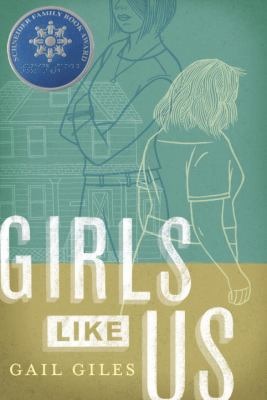 Girls Like Us by Gail Giles
Girls Like Us by Gail Giles
Girls Like Us is told by the voices of Biddy and Quincy, two "speddie" (special education) graduates paired up to live together after high school. Biddy is shy and gentle. Quincy is combative and closed off. Though they don't always get along and experience many frustrations and challenges in their new life, they ultimately build a true friendship and support system together.
Comments from the committee: "The voices in the story were authentic and originated from the characters who actually lived with disabilities. Not many books do this, and those that do, often do not do it well." "This book also does not promote stereotypes and actually breaks several often seen in other literature (e.g., those with disabilities cannot speak for themselves, every disability has the same manifestation in each individual, and so forth)." "The setting (life after high school) makes a bigger connection to young adult readers who are preparing for, are currently in, or have just recently experienced the transition from high school to the next step in their lives." "The plot is not a stereotype, but rather an effort at awareness- something desperately needed today." "This book needed to be written and I'm so glad it was."
Members of the 2016 Millikin Medal Committee were: Rachel Bicicchi, Mike Cook, Matthew Gremo, Mikayla Mendenhall, Sam Miller, Ryan Morgan, and Amanda Pippitt
For more information view the related news story.